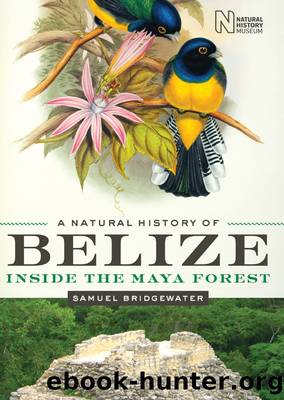A Natural History of Belize by Samuel Bridgewater

Author:Samuel Bridgewater
Language: eng
Format: epub
Publisher: University of Texas Press
Published: 2012-09-14T16:00:00+00:00
Drinking from the water vine (Pinzona coriacea). © William Milliken.
Making baskets from basket tie-tie (Desmoncus orthacanthos) requires great skill and is a craft for which Belize is famous. © Sam Bridgewater.
FOREST HANDICRAFTS
A number of plant species are harvested and used in the production of local crafts. On a small scale, attractive seeds are used in jewelry. The round black seeds of the soapberry (Sapindus saponaria) and Canna spp. as well as the striking brown seeds of guanacaste (Enterolobium cyclocarpon) provide three examples. Some of the most striking necklaces and bracelets are fashioned from the threaded seed of species belonging to the genera Ormosia, Erythrina, Rhynchosia, Canavallia, and Abrus. All belong to the pea family, and their seeds are shiny and variously patterned red and black, an adaptation to promote dispersal by birds. The seeds of Mucuna, a vine genus also belonging to the pea family, have been used for adornment all over the world. In most cases, the seeds of this genus are not traded but are carried around the planet as drift seed on ocean currents. Their striking form is a surprise to beachcombers on distant shores, who often collect their unusual find for fashioning into brooches, amulets, and even snuff boxes (see “Seed Dispersal” in chapter 5). Mucuna also has another use: its hard seeds heat up rapidly when rubbed vigorously and are valued as fire starters.
One of the crafts for which Belize is renowned is basket making. The primary species used to make larger baskets is the basket-tie-tie (Desmoncus orthacanthos), a spiny forest vine belonging to the palm family whose stem can arc and clamber through the canopy for hundreds of meters. The stem is cut into lengths of around four to six meters and quartered. Once its spines are stripped, the sections are ideal for weaving. Smaller baskets favored for sale to tourists by the Maya in the south of Belize are woven from fibers of jipajapa (Carludovica palmata). This is the same species used to make Panama hats. However, this understory plant does not occur in the Chiquibul Forest.
Download
This site does not store any files on its server. We only index and link to content provided by other sites. Please contact the content providers to delete copyright contents if any and email us, we'll remove relevant links or contents immediately.
| Automotive | Engineering |
| Transportation |
Whiskies Galore by Ian Buxton(40294)
Introduction to Aircraft Design (Cambridge Aerospace Series) by John P. Fielding(32329)
Small Unmanned Fixed-wing Aircraft Design by Andrew J. Keane Andras Sobester James P. Scanlan & András Sóbester & James P. Scanlan(32135)
Craft Beer for the Homebrewer by Michael Agnew(17439)
Turbulence by E. J. Noyes(7031)
The Complete Stick Figure Physics Tutorials by Allen Sarah(6631)
Kaplan MCAT General Chemistry Review by Kaplan(6044)
The Thirst by Nesbo Jo(5778)
Bad Blood by John Carreyrou(5761)
Learning SQL by Alan Beaulieu(5399)
Weapons of Math Destruction by Cathy O'Neil(5029)
Man-made Catastrophes and Risk Information Concealment by Dmitry Chernov & Didier Sornette(4728)
iGen by Jean M. Twenge(4693)
Digital Minimalism by Cal Newport;(4510)
Life 3.0: Being Human in the Age of Artificial Intelligence by Tegmark Max(4492)
Audition by Ryu Murakami(4091)
1,001 ASVAB Practice Questions For Dummies by Powers Rod(4034)
Electronic Devices & Circuits by Jacob Millman & Christos C. Halkias(4019)
Pale Blue Dot by Carl Sagan(3995)
